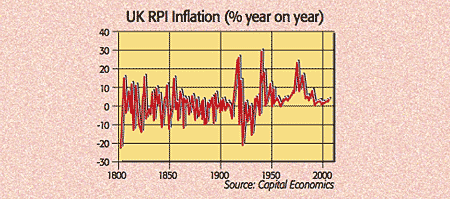
“It is remarkable that in just a few months fears have switched from inflation to deflation,” said Nigel Gault of HIS Global Insight. Now there is talk of a Japanese-style deflationary crisis. Last month the annual rate of consumer price inflation (CPI) tumbled from 5.2% to 4.5%, the sharpest fall in 16 years. Sharp slides in petrol (down 6.1% in October) and food inflation were chiefly responsible, while core inflation (minus food and energy) eased for the first time since February.
Deflation spiral could settle in…
Thanks to weaker recent commodity prices, waning food prices and falling underlying inflation as the economy shrinks, “inflation is poised to drop like a stone”, said Howard Archer of Global Insight. According to Capital Economics, CPI is set to dip into negative territory late next year, marking the first episode of deflation since 1947. But the danger is the “very severe recession” will create “enormous amounts” of slack in the overall economy – in the labour market, for instance, likely unemployment of 10% will depress wages – and thus bear down on core inflation. A more prolonged period of sliding prices raises the spectre of a Japanese-style deflationary spiral.
Consumers curb their spending in the expectation that prices will fall even further. This means lower sales and falling employment, thus reducing spending, overall demand and prices further in a downward spiral. An added element is that British households – retrenching, due to sliding house prices and rising unemployment – are the most indebted of any leading economy, and debt’s real cost rises during deflation. This portends a rush towards deleveraging, reinforcing the downward demand and price cut spiral. In Japan, zero interest rates failed to counter the burst debt bubble, and monetary policy has had scant impact in America and Britain so far.
…on both sides of the pond
In America, consumer prices slumped by 1% in October, a record monthly drop. Goldman Sachs expects inflation to turn negative next autumn. And signs of deflationary forces gaining momentum are mounting. The manufacturing capacity utilisation rate has hit a five-year low, while on the consumer front, retrenchment is in full swing. Companies are cutting prices across the board and retail sales posted their steepest monthly drop in 21 years in October. Households are clearly determined to start crawling out “from under their debt morass”, as David Rosenberg of Merrill Lynch put it. A Fed survey shows a record number of people intend to take on less debt; demand for mortgages is also near record lows. Deflation? “You ain’t seen nothing yet,” said Rosenberg.